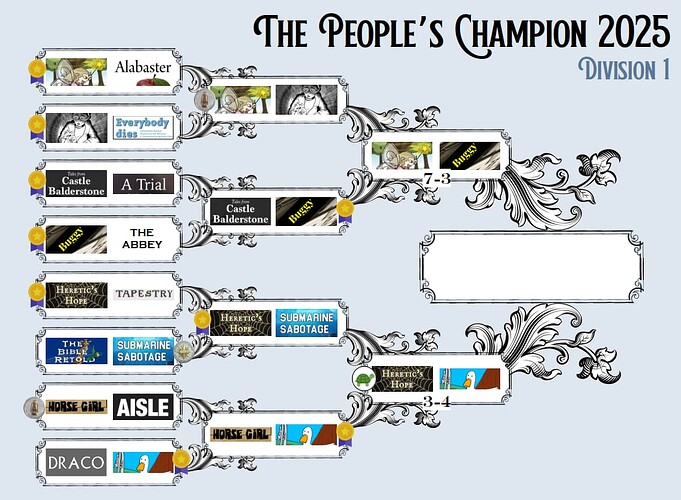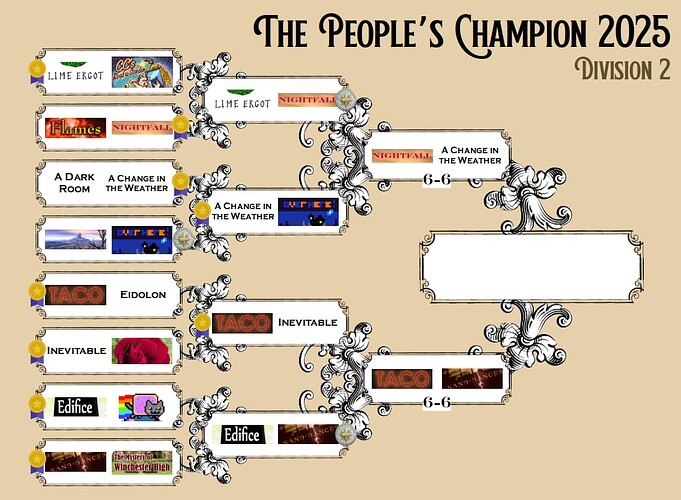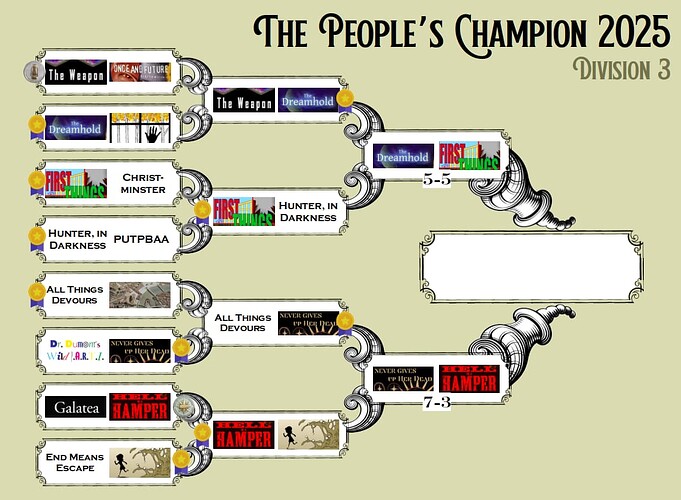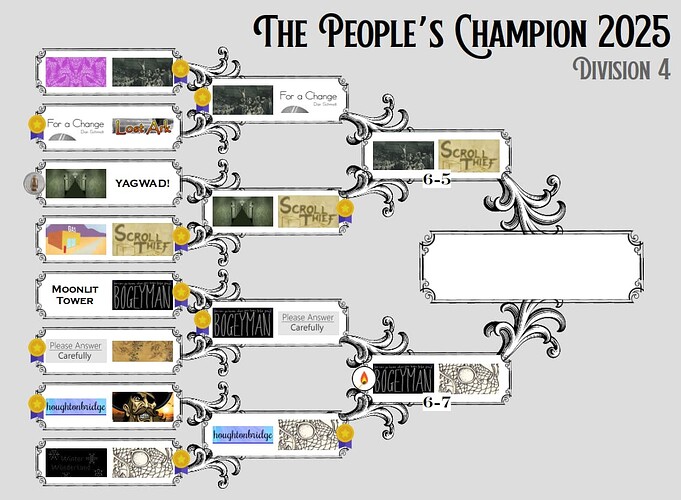OK, the tension is now officially unbearable, with four matches at tie status! With 2/3 or more of fans out there not yet having cast votes in these matches, surely some more votes can make the difference in these last 46 hours.
Following are my pitches for each of the eight games in question. Tonight and tomorrow evenings (for the western hemisphere) and Saturday morning (for the eastern) are a great time to give some of them a shot – for three of the pairings both contestants are comp-length games.
Nightfall won the 2008 XYZZY Awards for Best Story and Best Setting, and Emily Short’s review of it praises the “superb IF craftmanship.” It stands out in its historical context as an example of the trend toward smoother and more focused works emphasizing the player experience instead of the author’s cleverness. While the story part has some flaws (see Adam Cadre’s discussion on Radio K, for some examples), the setting is very well done, and you shouldn’t have any trouble reaching an ending in a couple of hours.
A Change in the Weather is one of those games that changed the course of history; thirty years on, modern games have much more in common with it than the imitative puzzlefests at various scales which dominated the form in the mid-90s. It had been on my “someday” list for a long time, so thanks to Denk for nominating it. It’s pretty easy to spoil this one’s more delicate aspects, so perhaps the best thing to say about it is that it starts out like a “walking simulator” but goes on to something more.
Taco Fiction is the prototype Ryan Veeder work for me: funny, polished, and engaging by virtue of a thousand little surprises in the interaction. What’s not to love about an inept protagonist who has set out to rob a taco shop but would clearly much rather be doing anything else? Or gameplay that’s so smooth it practically feels like watching a movie? Throw in some unexpected twists and turns, and you have a story that will stand out in your memory for a long time.
Sand-dancer is an unexpectedly gripping mini-drama doused in magical realism. Its raison-d’etre is to be a practical example of how to write interactive fiction with Inform 7, and that’s how I first encountered it, but if played as a game you’ll find that it’s a well-written and compelling comp-length experience. I wasn’t expecting it to go far when it was first entered in the rolls, but after playing it during the “quiet play” period, I thought it might end up being a surprise hit since it doesn’t seem to be well-known to those who haven’t read Reed’s book.
(This is the longest pair.)
First Things First was new to me, and who knows how long it would have been until I got around to trying it if it weren’t for the fortuitous nomination by BadParser and another anonymous fan. I didn’t know much about it going in, and I think that was a good thing, so I hesitate to say very much that’s specific. I didn’t have high expectations since I hadn’t seen much discussion of it beyond mention that it was a time travel game. Starting from a fairly stock baseline, it ended up pleasantly surprising me a number of times as I played through it – it has a way of changing the mood and events being anticipated in a manner that doesn’t feel discontinuous, so doesn’t throw you (but does keep the gameplay feeling fresh).
The Dreamhold is more than just a tutorial adventure and more than it seems; my IFDB review discusses its unique aspects. I’m not sure how much someone just trying it for an hour or two will get of its deep structure, but you really can’t go wrong with one of Andrew Plotkin’s demonstrations that even the stalest conventional tropes (in this case, waking up with amnesia) can be revitalized.
Bogeyman was also new to me. I pretty much hate it, but since that’s basically the point, the author has my respect for this one. It goes some dark places and revels in it – if you like the kind of horror that you can’t stop reading/watching even though you want to, then you’ll probably love this one.
Metamorphoses is a puzzler with a deeper story that you have to work a bit to unearth. Not quite Emily Short’s first public work, but her second and the first submitted to a competition – where it took 2nd in the IF Comp and later won the XYZZY for Best Writing. Although it’s overshadowed by many of Short’s later works, you can definitely see elements of her signature style on display in their early forms. A single ending won’t tell the whole tale here, so maybe it’s better to consider this as a more-than-comp-length work, but if you find yourself (like I did) spending quite a long time investigating every last detail of a mural, you’ll realize how well you’ve been hooked.



